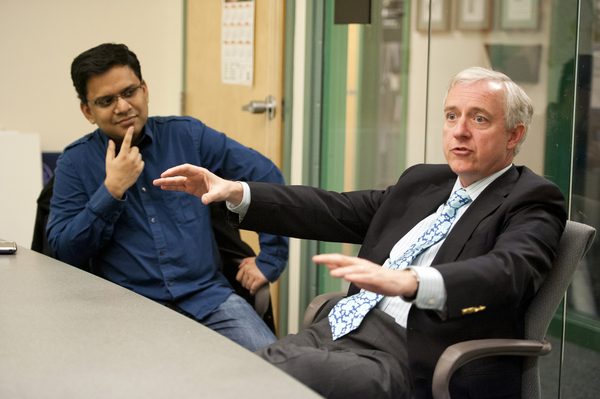Climate change and national security

“We tend to build our bases at sea level,” deadpanned Titley, who led the Navy’s first Task Force for Climate Change and built a career studying the world’s oceans. “This is something we’re going to have to deal with. We’re not the Air Force—we can’t build our bases at 6,000 feet.”
Last week, Titley was the featured speaker at the School of Public Policy and Urban Affairs’ Open Classroom series, which this semester focuses on the impact of climate change.
Titley said rising seas—which he predicts could increase by as much as a meter by 2100—are just one concern for the Navy and the nation’s military community. Rising tides and environmental changes could forever alter water supplies, food chains, and geography that have stayed largely the same for thousands of years.
“If you remember nothing else, know this is all about water,” he said. “There’s too much in some places, too little in others. It’s melted in some places where it’s supposed to be solid; it’s salty in places it’s supposed to be fresh. And that affects a lot, from national security to food production.”
Titley noted that while climate has been largely stable for about the last 15,000 years, it has begun to enter uncharted territory, particularly in places like the Arctic, which has seen dramatic changes in ice melt cycles in the last decade.
“For most of human history, the extremes stayed where they were; the averages were what we had come to expect,” Titley said. “But now the climates are starting to change, and we have to adapt.”

The Navy is monitoring how melting ice is opening up the long-sought Northwest Passage, a new ocean passage between the Atlantic and Pacific oceans north of Canada.. Photo by Thinkstock.
The Navy, he said, is monitoring how melting ice is opening up the long-sought Northwest Passage, a new ocean passage between the Atlantic and Pacific oceans north of Canada. In addition to challenges caused by melted ice, the new ocean route raises question of trade, national boundaries, and navigable routes (cartographers have had little need or opportunity to chart an ocean that until recently was almost entirely covered by ice year-round).
“For the first time in 500 years, we’re opening up a new ocean,” Titley said. “The last guy to do that was Christopher Columbus.”
Titley said the military is uniquely suited to tackle climate change issues due to a deeply ingrained tradition of long-term planning on everything from demographics to political regimes.
The Open Classroom series, which is hosted by policy school and engineering professor Matthias Ruth, interim policy school dean Joan Fitzgerald, and former president of the Conservation Law Foundation Douglas Foy, continues Wednesday evenings through April 17 in 20 West Village F. The classes run from 6–8 p.m.
This week’s session will focus on transportation—which in the United States is responsible for one-third of all carbon emissions, Ruth noted—and features Professor of Practice in Law and Public Policy Stephanie Pollack and Al Biehler, a former state transportation official in Pennsylvania and a faculty member at Carnegie Mellon University.





